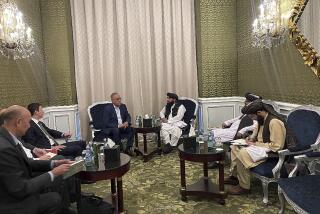Danger Ahead for Secularists
- Share via
While many people are optimistic about the outcome of the U.N.-sponsored meeting on Afghanistan in Bonn, Germany, there could be trouble ahead.
The “winners” in Bonn have a history of repression almost equaling the Taliban’s. And the Afghans most likely to embrace democracy were excluded from active participation, meaning the losers are likely to be, yet again, the Afghan people.
The important Afghans excluded from the Bonn negotiations do not side with any of the feuding parties, although, for security reasons, they may belong to one or the other political group. Many of these “dissidents” are among the elite, which is largely based abroad, but others are found throughout Afghanistan. They refer to one another as “democrats,” “nationalists” or “independent patriots.” They are from all the ethnic groups as well as Sunni, Shiite and Ismaili Muslims. While he has not publicly proclaimed himself as part of this group, the newly appointed head of Afghanistan’s temporary administration, Hamid Karzai, is not on a very different wavelength.
The fact that these secularists resemble a secret society more than a political party goes back to the war against the Soviets. In prewar Afghanistan, there were few doctrinaire Islamists, or fundamentalist Muslims. The fundamentalist parties were created on orders of Pakistan’s military intelligence in the hopes of creating an Afghan government subservient to Pakistan. The masses of Afghan refugees had to register with one or the other of those Islamist parties to get food rations.
Those willing to fight the Soviets could get weapons only as members of an Islamist party. These procedures did not win many Afghans over to the new ideology of Islamism, which is by no means the same as old Islam. Many only paid lip service to Islamism to survive.
Then after the Soviets withdrew, the Pakistanis failed to install their proteges as the new rulers in Kabul, which brought another horse into play: the Taliban. Its core consisted mainly of orphans from refugee camps who had been indoctrinated with the most extreme version of Islam, which most Muslims consider absurd. They pushed some Islamists aside and co-opted others. Secular-minded Afghan nationalists were forced to lie low.
All the same, the independent nationalists established themselves in a few corners of the country such as the sparsely inhabited southwest, where they shook off the Taliban and created their own administration even before the U.S. intervention. Curiously, I saw only one minor press reference to this. On the many maps of Afghanistan published every day, the area was shown as being under the Taliban and then under the Northern Alliance. This did not change even when the independent nationalists took Shindand, Afghanistan’s most important air base.
Should there be fair elections, Afghanistan’s political scene is going to change profoundly. Ethnicity will play a less dominant role, and the ideological parties will lose. At present, the strongest among those is the Jamaat-i-Islami of Northern Alliance leader Burhanuddin Rabbani, a fundamentalist mullah who scorns democracy. As one women’s rights activist put it, the only difference between Rabbani and the Taliban’s Mullah Mohammed Omar is the length of their beards.
Rabbani’s followers are the strongest component of the Northern Alliance. Allowing them to enter Kabul was a mistake that threatens to undo the success of the United States’ Afghan campaign. Although Rabbani’s Islamists got the lion’s share in the interim government approved in Bonn (the ministries of defense, interior and foreign affairs), they are not likely to share power; they already have set up their own government in Kabul.
The independent nationalists have formed an Islamic National Council of the Afghan Peoples. Their representative was invited to Bonn but was relegated to observer. Given protection by U.N. peacekeepers, the secularists would be a major force for democracy, especially if Afghanistan’s elite--100,000 educated Afghans live abroad--feels safe to return. But if there is no protection by U.N. peacekeepers, Rabbani’s Islamists will seek to exterminate the secularists, just as they tried to do in the past.
*
Khalid Duran is the author of “The Taliban and the Future of Afghanistan,” just released by Ullstein, Berlin. E-mail: MECouncil @aol.com.
More to Read
Sign up for Essential California
The most important California stories and recommendations in your inbox every morning.
You may occasionally receive promotional content from the Los Angeles Times.










